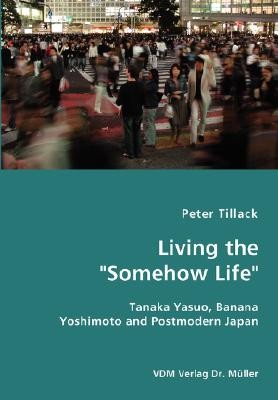
- We will send in 10–14 business days.
- Author: Peter Tillack
- Publisher: VDM Verlag Dr. Mueller E.K.
- Year: 2007
- Pages: 180
- ISBN-10: 3836427508
- ISBN-13: 9783836427500
- Format: 17 x 24.4 x 1 cm, softcover
- Language: English
- SAVE -10% with code: EXTRA
Living the Somehow Life-Tanaka Yasuo, Banana Yoshimoto and Postmodern Japan (e-book) (used book) | bookbook.eu
Reviews
Description
Tanaka Yasuo's Nantonaku, kurisutaru (Somehow, Crystal, 1980) and Yoshimoto Banana's Kitchin (Kitchen, 1987) have been denigrated as em-ble-matic of a so-called "bastardized line" of Japanese literature, characterized by an un-abashed celebration of a "late-capitalist" consumerist ethos. Close rea-dings of these works are undertaken in order to demonstrate that, while these works are reflective of late-capitalist postmodern Japan (the de-ve-lop-ment of which is delineated prior to the readings), they nonetheless posit uniquely post-modern strategies for critically engaging issues of identity for-ma-tion and main-tenance, and the creation of meaning as they appear in the con-temporary Japanese socio-cultural nexus. I argue that if such strategies are not immedi-ately apparent, it is because they hold to what critic Fredric Jameson, in his dis-cussion of the requisites for a "new political art," calls "the truth of postmo-dernism." This work will interest those concerned with postwar and contemporary Japa-nese culture, society and literature, as well as those engaged in the study of "global culture."
EXTRA 10 % discount with code: EXTRA
The promotion ends in 20d.17:26:39
The discount code is valid when purchasing from 10 €. Discounts do not stack.
- Author: Peter Tillack
- Publisher: VDM Verlag Dr. Mueller E.K.
- Year: 2007
- Pages: 180
- ISBN-10: 3836427508
- ISBN-13: 9783836427500
- Format: 17 x 24.4 x 1 cm, softcover
- Language: English English
Tanaka Yasuo's Nantonaku, kurisutaru (Somehow, Crystal, 1980) and Yoshimoto Banana's Kitchin (Kitchen, 1987) have been denigrated as em-ble-matic of a so-called "bastardized line" of Japanese literature, characterized by an un-abashed celebration of a "late-capitalist" consumerist ethos. Close rea-dings of these works are undertaken in order to demonstrate that, while these works are reflective of late-capitalist postmodern Japan (the de-ve-lop-ment of which is delineated prior to the readings), they nonetheless posit uniquely post-modern strategies for critically engaging issues of identity for-ma-tion and main-tenance, and the creation of meaning as they appear in the con-temporary Japanese socio-cultural nexus. I argue that if such strategies are not immedi-ately apparent, it is because they hold to what critic Fredric Jameson, in his dis-cussion of the requisites for a "new political art," calls "the truth of postmo-dernism." This work will interest those concerned with postwar and contemporary Japa-nese culture, society and literature, as well as those engaged in the study of "global culture."


Reviews